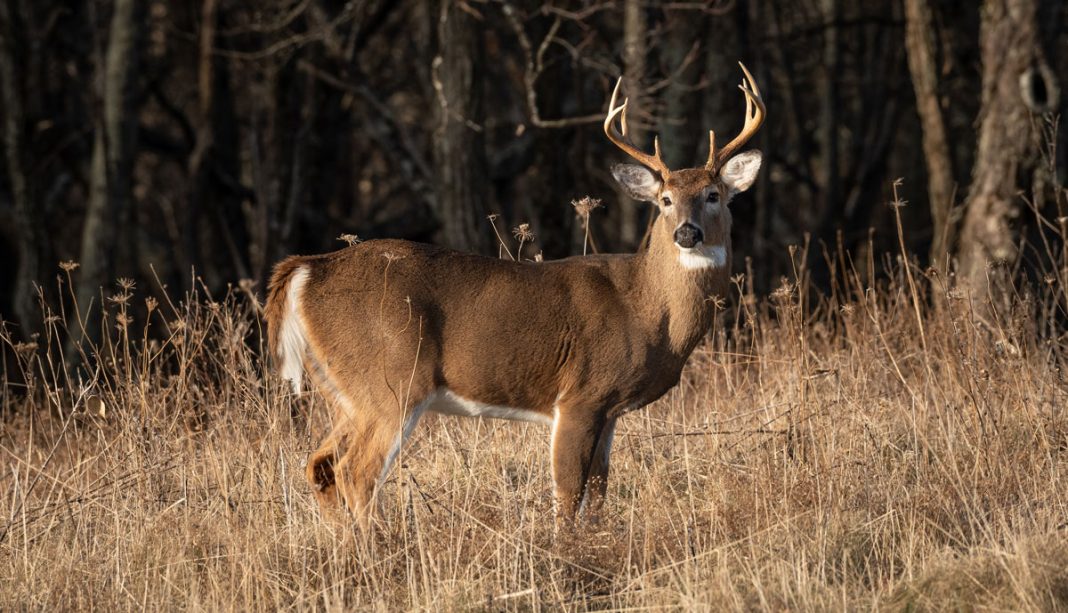PETERBOROUGH—The Ontario Federation of Anglers and Hunters (OFAH) is pleased with an announcement by the province last week that action is being taken to keep Ontario free of the deadly chronic wasting disease (CWD).
“The province has announced that they made legislation amendments; it’s great news,” stated Keith Munro, wildlife biologist with the OFAH last Thursday. “It is a huge announcement because it provides for the ability to respond immediately (if CWD is suspected in an area), which is key.”
The government has passed legislation and developed a plan to allow the province to act quickly if wildlife diseases (such as CWD, a progressive, fatal brain disorder that mostly affects deer and elk) is discovered in Ontario.
If CWD were detected in Ontario, the legislative changes will allow the government to: create response zones where special rules would apply, such as requiring hunters to submit animals for disease testing; enable people to undertake activities that would otherwise be prohibited, such as authorizing a licenced hunter to dispatch symptomatic wildlife within a specified area; and implement long-term measures, such as restricting the exportation of certain live animals from a jurisdiction where CWD has been detected.
“We recognize the significant value wild deer have as an important part of Ontario’s biodiversity, and as a symbol of heritage to many Ontarians,” said John Yakabuski, Minister of Natural Resources and Forestry (MNRF), in a release. “These measures will support Ontario’s hunters and an industry that creates jobs and makes an important economic contribution to our province.”
The measures to protect wildlife are part of the Better for People, Smarter for Business Act, which will simplify and modernize regulations Ontarians need, while eliminating outdated or duplicative requirements, the release notes.
“One of our top priorities in the Better for People, Smarter for Business Act, is protecting our environment and safeguarding public health in the most effective way possible,” said Prabmeet Sarkaria, associate minister of Small Business and Red Tape Reduction. “I’m pleased the red tape reduction legislation empowers Ontario to be proactive and get ahead of any potential threats to our wildlife in a direct and streamlined manner.”
“Should CWD be discovered in Ontario, these measures will go a long way to help prevent the spread of the disease to Ontario farmed and wild cervids and protect public health,” said Ernie Hardeman, Minister of Agriculture, Food and Rural Affairs. “We also encourage Ontario’s cervid farmers to follow the national guidelines for bio-security to help protect their herds.”
CWD affects members of the cervid family–deer, elk moose and caribou. While it has not been detected in Ontario, CWD was discovered in 2018 on a deer farm in Quebec, close to the Ontario border. It has also been found in all five states bordering Ontario.
“We applaud the government for enacting these changes that will enable it to respond quickly and decisively to a detection of CWD,” said Angelo Lombardo, executive director OFAH. “This is a necessary component of keeping Ontario CWD-free and something the OFAH has been seeking for years.”
An OFAH release stated, “the OFAH was pleased to see the provincial government announcement on Wednesday regarding new measures to protect Ontario’s cervid species from chronic wasting disease. New legislation focusing on rapid response to CWD detection has been passed and it outlines the government action plan should CWD be found in Ontario. This legislation will allow the government to create response zones in areas where hunters would be required to submit animals for testing. It would also allow licenced hunters to dispatch symptomatic wildlife in certain areas, while creating restrictions on the movement of live animals out of areas where CWD has been detected.”
“The OFAH has been pushing this government to take serious action on CWD. These amendments to the Fish and Wildlife Conservation Act are incredibly important because we know that a rapid response is needed if CWD is detected and these changes give the government the power to mount this response,” said Mr. Munro. “We are also very pleased that the minister has committed to working with the Ontario Ministry of Agriculture, Food and Rural Affairs on the issue of deer farms, which are the major source of risk for CWD being introduced into the province.”
CWD has been a major OFAH advocacy priority for years and concern for its spread become more heightened in 2018 when the disease was detected just across the Ontario border in Quebec, which makes news of these legislative changes all that more important.”
“The OFAH has been advocating for many of these exact changes for years-changes that will significantly reduce the risk of CWD entering the province, ensuring the health of Ontario’s cervids and all the benefits they provide,” Mr. Munro said. “Prevention remains the most important priority as it is much easier to prevent CWD from arriving in Ontario than trying to respond to it once it arrives, but the announced changes make some real improvements that will help keep CWD out of the province.”
Earlier this year the OFAH held a conference on CWD, bringing together experts from across North America to discuss the serious nature of this disease. Following the conference, the OFAH created the Canadians Concerned About CWD, a diverse group of stakeholders from across the country working to combat CWD, while keeping individuals and groups across Canada connected and informed on the latest CWD news and facilitating opportunities for collaboration on public awareness and advocacy campaigns.
Mr. Munro pointed out the province has not posted its finalized plan, “but its all really good stuff. I’m interested to see the final plan. Even if they adopt what they are proposing at this point, it is a vast improvement on what is in place now.” However, he cautioned, “they still have to deal with the issue of deer farms.”





